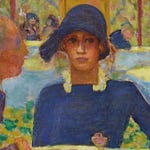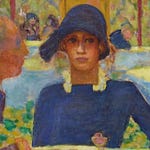THE PROBLEM was Lorna’s elusive beauty. Clara and Bertha were envious of it from the moment they saw her, although they never quite realized that that was what they envied. In fact, they hardly considered Lorna attractive. Most of the time Lorna’s appearance seemed to them just on the pretty side of plain. Her beauty really did seem to live in the mind, or the heart, of her beholder. Bertha and Clara never saw it, but Lorna possessed, throughout her life, an elusive loveliness that showed from certain angles at certain moments, for certain people, a beauty that could enchant a person in the blink of an eye and then would disappear if she turned her head or touched her hair. That fleeting beauty might return a moment or an hour later, all the more tantalizing and desirable for having been away, for being so hard to see clearly, for being so like a twinkling star on a hazy summer night. Bertha saw and understood the effect of this scintillating beauty, even if she couldn’t see the beauty itself, and it seemed to her bewitching and unfair, an advantage given to Lorna over her, for she was a homely, large-boned, gangling girl.
That intriguing beauty never left Lorna, not even in the last years of her life, not even when she was ill, when she looked older than she was, when she was pale and weak, and her skin hung in loose folds. Her beauty in age was not of the type that is a lingering reminder, the lingering remainder, of youthful beauty, the type that makes people say, “She must have been a beauty in her day.” It was an unchanged, undiminished quality; perhaps it was really a manifestation of inner beauty, and only its representation, never its essence, changed as Lorna aged, so that it was always appropriate to her age and condition.
ACCORDING TO MAY CASTLE, Lorna’s friend and confidante for more than forty years, Lorna never forgot Bertha and Clara’s teasing.
She told me that at an early age, and I mean quite an early age, while Lorna was still sleeping in her parents’ room, Clara and Bertha began to call her Cinderella. Well, Cinderella! Isn’t that rather a stupid thing for two sisters to do, call their younger sister Cinderella? If Lorna was Cinderella, Clara and Bertha would have to be the ugly stepsisters, wouldn’t they? Well. I met those sisters on a couple of occasions, when they were grown women, and I would say that they might have been passably good-looking girls once, perhaps when they were very young, but they had become — well — dowdy and positively homely. I really think they brought it on themselves. Do you think that can’t be done? Believe me, it can. And those husbands of theirs! At any rate, Clara and Bertha began calling her Cinderella, out of envy you see, and anger, and because Lorna had this absolutely haunting beauty. Well, my dear! It was haunting, you would have to call it haunting. It would positively light her up at unpredictable times, and the sisters must have been — well! — just depressed as hell by the sense that everything would work out for Lorna the way everything worked out for Cinderella, in a way that things would never work out for them, because of this odd beauty she had, you see. Well, they kept it up as she grew, and then when the sisters began to have suitors, the fellows loved to bounce Lorna on their knee, and so on. And when Lorna began going to dances, the sisters were still unmarried and they were still going to the dancehall themselves, hunting. Well, their men friends would bring little Lorna punch and ask to be put on her card, and they began calling her Cinderella too. But when they said it, these young men, there was moonlight in it, you see. Well, only then did it dawn on Clara and Bertha that they might be creating a sort of Frankenstein’s Cinderella. Don’t you just love the idea? Well, they decided that perhaps they had better knock it off. But it was too late, you see, because Lorna had been hurt, terribly hurt, by her sisters’ taunting, so hurt that she had no love, no affection of any sort, left for them, and because she was determined now that this name she had endured, this Cinderella that she’d heard so often as a taunt would become a — badge — or a — title — that she could take to show that she had won in the end. When she sent birthday or Christmas cards to her sisters she signed them Cinderella, and when she had a daughter of her own she named her Ella.
Have you missed an episode or two or several?
You can begin reading at the beginning or you can catch up by visiting the archive or consulting the index to the Topical Guide.
You can listen to the episodes on the Personal History podcast. Begin at the beginning or scroll through the episodes to find what you’ve missed.
You can ensure that you never miss a future issue by getting a free subscription. (You can help support the work by choosing a paid subscription instead.)
At Apple Books you can download free eBooks of “My Mother Takes a Tumble,” “Do Clams Bite?,” “Life on the Bolotomy,” “The Static of the Spheres,” “The Fox and the Clam,” “The Girl with the White Fur Muff,” “Take the Long Way Home,” “Call Me Larry,” and “The Young Tars,” the nine novellas in Little Follies, and Little Follies itself, which will give you all the novellas in one handy package.
You’ll find an overview of the entire work in An Introduction to The Personal History, Adventures, Experiences & Observations of Peter Leroy. It’s a pdf document.












